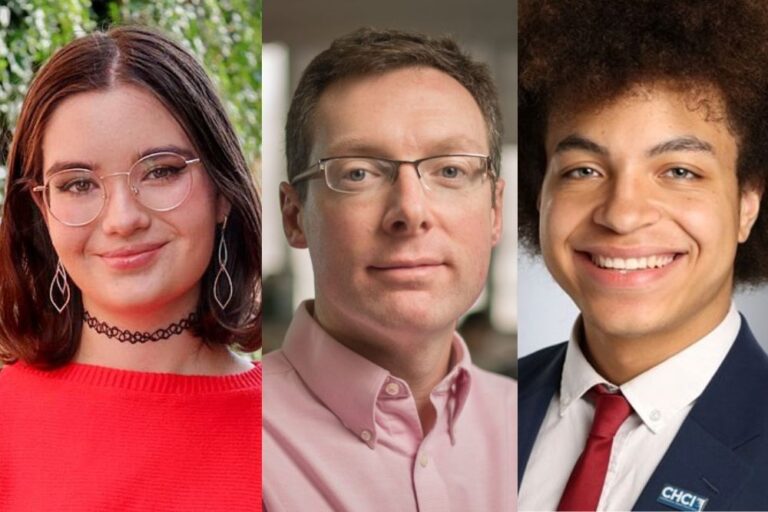Among the first generation on her mother’s side born outside the Jim Crow South and the first generation on her father’s side born outside Ghana, West Africa, Dr. Chamara Jewel Kwakye’s family, on both sides, have always placed education as paramount, and not just any kind of education, but rather an education that clearly connects to the freedom of the local Black community in addition to the collective freedom for Black people throughout the diaspora.
“So, when presented with an opportunity to apply for and join the Department of African American and African Studies at MSU, a department that is unapologetically committed to Black feminism, the theory and praxis that’s nurtured and guided me all my life, to serve students as both an advisor inside and outside of the classroom and to be able to do so with the keen of advising them ‘beyond survival into wellness,’ it was an easy decision,” she said. “I’ve been waiting my entire professional life for an opportunity like this.”

Dr. Kwakye joined MSU’s Department of African American and African Studies (AAAS) on September 29, 2021, as an Academic Specialist and looks forward to working collaboratively with other faculty and staff as this new department is being built.
“I’m showing up to the AAAS new department build ready to work with colleagues and bringing my knowledge of student development theory, my expertise in Black feminist pedagogy, praxis and curriculum development, and my personal ability to make people feel welcome to be their full and authentic selves,” said Kwakye, who has a Ph.D. in Education Policy Studies from the University of Illinois, Urbana-Champaign, an M.A. in Post-Secondary Administration and Students Affairs from the University of Southern California, and a B.A. in Ethnic Studies and Sociology from the University of California, Riverside.
Dr. Kwakye’s interdisciplinary interests are at the intersections of race, class, gender, sexuality, ethnography, performance, and pedagogy. Her areas of specialization are Black feminism, Black girlhood, gender and sexuality in the Black diaspora, performance studies, qualitative methodologies, digital humanities, and community engagement. She is especially interested in the stories Black women and girls tell that examine their power and agency in oppressive spaces.
So, when presented with an opportunity to apply for and join the Department of African American and African Studies at MSU…it was an easy decision. I’ve been waiting my entire professional life for an opportunity like this.
“I am an artist and a scholar, specifically I am a writer and a performer. For most of my career, I have been asked either passively or outright to separate those two identities in some professional spaces,” Dr. Kwakye said. “I am excited to be in space with other artist scholars and in a space that equally affirms those identities and doesn’t see them as antithetical but knows that it’s a strength and a necessity to revolutionary knowledge production.”
Dr. Kwakye currently is working on a monograph, entitled Cimarron (Spanish for “wild and untamed”), which is an intergenerational telling of her maternal ancestors’ migration to California from Arkansas via the Great Migration and her paternal elders’ story as immigrants to the United States from Ghana, West Africa. Encapsulated in their stories are her own stories of Black girlhood in South Los Angles and how she makes sense of her identity as the first generation born in the United States and the first generation born outside the Jim Crow South and the history of several migrations in California.

Dr. Kwakye co-edited, Wish to Live: The Hip-hop Feminism Pedagogy Reader, and co-wrote, starred, and produced several ethnographic performances based on the lives of Black women and girls. She also has published works on qualitative methods, hip-hop feminist pedagogy, and a monograph that examines Black women and girls’ pedagogy and praxis of love and labor.
Prior to MSU, Dr. Kwakye was a Lecturer for the Institute for Women’s, Gender and Sexuality Studies at Georgia State University, where she taught courses spanning four disciplines: Women’s, Gender and Sexuality Studies; Education; African American Studies; and History ranging from introductory courses to specialized seminars.
Dr. Kwakye also has served on the English faculty for the Galloway School in Georgia, as an Assistant Professor at the University of Kentucky, and a Chancellor’s Postdoctoral Research Associate at the University of Illinois, Urbana-Champaign.
Our hope is to create not only a space on campus for those committed to the study of Black people throughout the diaspora but also a space where people can come and be surrounded by, nurtured, and accountable to the life-giving force and abundance of Blackness.
Her commitment to pedagogy extends beyond the university. She serves as Co-Organizer for Saving Our Lives, Hear Our Truths, (SOLHOT), a space dedicated to Black girlhood celebration, particularly as it relates to the arts and culture. She also has served as Community Advocacy Director, Lead Guest Artist, and Guest Artist for The Girl Project of Kentucky, an arts meets activism program designed to inspire, educate, and empower girls of all ages to challenge the misrepresentation of girls and women in American media culture through performing arts education. In addition, she serves as a board member and program director for The Initiative for the Creative Arts (TIFCA), an organization that uses hip-hop, beat making, and music production to engage youth in social justice and social-emotional development and learning.
Now that she is at MSU, Dr. Kwakye says she is “excited to see how my own research on Black girlhood, story crafting, and performance grows and enhances by being in such a rich intellectual and creative community.” She also wants to let students know that “AAAS is here and ready to support their individual and our collective Black freedom dreams. Our hope is to create not only a space on campus for those committed to the study of Black people throughout the diaspora but also a space where people can come and be surrounded by, nurtured, and accountable to the life-giving force and abundance of Blackness.”


